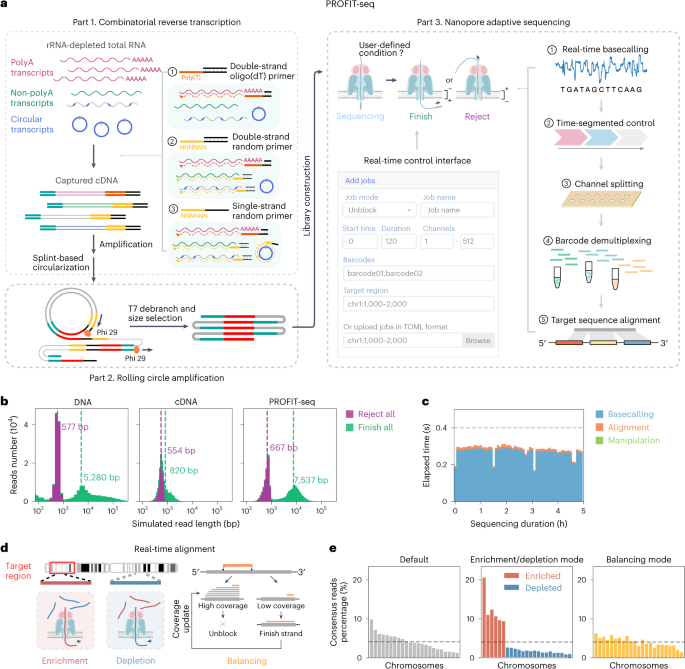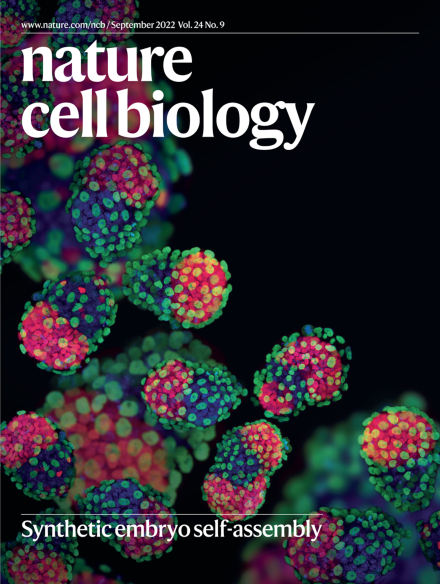Real-time and programmable transcriptome sequencing with PROFIT-seq
IF 17.3
1区 生物学
Q1 CELL BIOLOGY
引用次数: 0
Abstract
The high diversity and complexity of the eukaryotic transcriptome make it difficult to effectively detect specific transcripts of interest. Current targeted RNA sequencing methods often require complex pre-sequencing enrichment steps, which can compromise the comprehensive characterization of the entire transcriptome. Here we describe programmable full-length isoform transcriptome sequencing (PROFIT-seq), a method that enriches target transcripts while maintaining unbiased quantification of the whole transcriptome. PROFIT-seq employs combinatorial reverse transcription to capture polyadenylated, non-polyadenylated and circular RNAs, coupled with a programmable control system that selectively enriches target transcripts during sequencing. This approach achieves over 3-fold increase in effective data yield and reduces the time required for detecting specific pathogens or key mutations by 75%. We applied PROFIT-seq to study colorectal polyp development, revealing the intricate relationship between host immune responses and bacterial infection. PROFIT-seq offers a powerful tool for accurate and efficient sequencing of target transcripts while preserving overall transcriptome quantification, with broad applications in clinical diagnostics and targeted enrichment scenarios. Zhang, Hou, Ma et al. present PROFIT-seq, a sequencing strategy that involves adaptive sampling of transcriptome libraries to enrich genes of interest and allows unbiased quantification of the whole transcriptome.


利用 PROFIT-seq 进行实时和可编程转录组测序
真核生物转录组具有高度的多样性和复杂性,因此很难有效地检测到感兴趣的特定转录本。目前的靶向 RNA 测序方法通常需要复杂的测序前富集步骤,这会影响整个转录组的综合表征。在这里,我们介绍了可编程全长同工转录组测序(PROFIT-seq),这是一种既能富集目标转录本,又能对整个转录组进行无偏量化的方法。PROFIT-seq 采用组合反转录技术捕获多聚腺苷酸、非多聚腺苷酸和环状 RNA,并结合可编程控制系统,在测序过程中选择性地富集目标转录本。这种方法可将有效数据产量提高 3 倍以上,并将检测特定病原体或关键突变所需的时间缩短 75%。我们应用 PROFIT-seq 研究了结直肠息肉的发展,揭示了宿主免疫反应与细菌感染之间错综复杂的关系。PROFIT-seq 为目标转录本的精确高效测序提供了强大的工具,同时保留了整体转录本组的定量,在临床诊断和靶向富集领域有着广泛的应用。
本文章由计算机程序翻译,如有差异,请以英文原文为准。
求助全文
约1分钟内获得全文
求助全文
来源期刊

Nature Cell Biology
生物-细胞生物学
CiteScore
28.40
自引率
0.90%
发文量
219
审稿时长
3 months
期刊介绍:
Nature Cell Biology, a prestigious journal, upholds a commitment to publishing papers of the highest quality across all areas of cell biology, with a particular focus on elucidating mechanisms underlying fundamental cell biological processes. The journal's broad scope encompasses various areas of interest, including but not limited to:
-Autophagy
-Cancer biology
-Cell adhesion and migration
-Cell cycle and growth
-Cell death
-Chromatin and epigenetics
-Cytoskeletal dynamics
-Developmental biology
-DNA replication and repair
-Mechanisms of human disease
-Mechanobiology
-Membrane traffic and dynamics
-Metabolism
-Nuclear organization and dynamics
-Organelle biology
-Proteolysis and quality control
-RNA biology
-Signal transduction
-Stem cell biology
 求助内容:
求助内容: 应助结果提醒方式:
应助结果提醒方式:


